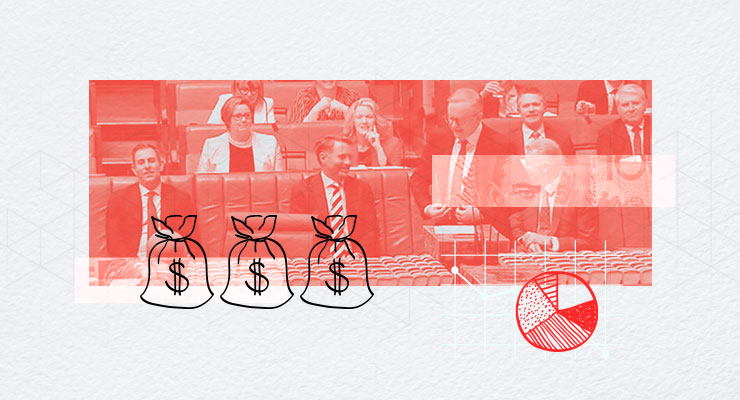
Labor has responded to an unforgiving combination of global uncertainty and mountains of national debt by developing a budget it says will be “responsible” and the first step towards a “resilient” Australian economy.
Treasurer Jim Chalmers, who mentioned those two words over and over in his Tuesday night speech, said he was forced to make “hard decisions for hard times” when putting together his first budget.
Earlier this year, his party spent the election campaign hammering the former government for not doing enough to take care of the elderly, support working parents, or stimulate wage growth. With Tuesday’s budget, Chalmers said he wants to make all those things happen — but he also sought to temper expectations by repeatedly pointing to the tough economic climate abroad and the “wasted decade” under the Coalition.
Chalmers told Parliament the fact that real wages are lower today than a decade ago was proof opportunities had been squandered under his predecessors.
But he said real wages could start to grow again as soon as 2024.
The budget forecasts inflation will peak at 7.75% before the end of the year, followed by a likely slowdown to 3.25% by the next financial year, before sinking towards the Reserve Bank’s target range by the following 12 months. Until then, soaring costs of food and electricity will continue “eating into pay packets”, Chalmers said.
The treasurer said his hope to ease the cost of living would be a challenge, given the fear “reckless” relief could add to inflation.
“Inflation is the primary influence on the budget,” he explained to reporters poring through the financial documents on Tuesday, in the hours before they were made public.
Chalmers presented what he called a “five-point plan for cost-of-living relief”, focusing on cheaper child care, an expansion of paid parental leave, less expensive medicines, more affordable housing, and wage growth. The price tag of that package, $7.5 billion, should help “put some money back in people’s pockets, [boost] productivity, and [grow] the economy”, he said.
“But it’s carefully targeted and carefully timed, so that it avoids placing additional pressure on inflation,” Chalmers added.
There were two pieces of news in the budget that had been committed to after the election, Chalmers told reporters. One was the expansion of paid parental leave — a four-year endeavour to progressively scale up the number of weeks parents get to stay home with pay until 2026, when they’ll get six months off at a cost to taxpayers of $540 million.
The second bit of news was what Chalmers called a Housing Accord, agreed to by the Commonwealth, state and territory governments, the superannuation industry, and others.
“The ambition of this accord is big and it’s bold — an aspiration to build 1 million new, well-located homes over five years from 2024,” he said in his budget speech.
While he said “most of this supply needs to come from the market”, the government would splurge an initial $350 million to fund 10,000 new affordable homes, on top of existing commitments.
State and territory governments will band together to supply another 10,000 homes, to be built where there are jobs but not enough rental units.
Another $2.5 billion would be spent fulfilling another election promise: improving aged care.
Chalmers said that expense was one the government would happily “choose to pay for” because it’s one of the things Australians care about most.
“We choose to pay for better aged care, and better wages for those giving care,” he said.
“This budget invests more than $2.5 billion to put nurses back into nursing homes, improve the quality of food, and respond to the recommendations of the royal commission.”
Chalmers bragged that most of the policies had been offset across the next two years, when inflation would make paying interest on government loans particularly expensive.
He said Australians “do not have enough to show for a trillion dollars of debt” racked up by the former government, which he said had put “gross debt as a share of GDP at its highest level in more than 70 years”.
Chalmers also claimed Labor’s budget would improve the nation’s deficit by $41.1 billion, to cost $36.9 billion in the current financial year.
He also said the nation’s gross debt-to-GDP would be 37.3% during the same period. “That’s less debt than our predecessors — less debt, with more to show for it,” he said.








I really appreciate and welcome such spare and accurate reportage – not opinion, no exaggeration and no adjectival axes being ground.
Quite a relief. Thank you.
Again the Chalmers debt and deficit aversion is regarded as a sign of Labor maturity. Crikey has comments wall to wall today clinging to neoliberal shibboleths. Disappointing.
“But there’s more paid parental leave, cheaper childcare and more aged care funding; more aid for the Pacific; vocational education funding; and a new Housing Accord to build more affordable homes near places of economic growth. And, of course, extra spending on the NDIS. Lots of it.” – Keane, in another article.
Gaucherie, Sling off at the debt & deficit focus and you miss what they are spending on – unarguable ALP core areas, delivering on election promises, that people want.
Elsewhere, McManus has recently promoted the fact that “Workers on minimum award wages in travel, tourism, airlines and the hospitality industry will have now received their 5.2% pay increase. Check your pay, make sure you got it, join your union.” The ALP is delivering on increasing wages for the low income workers, as promised. Sick of seeing this trumpeted in mainstream media in the last fortnight? No, me either.